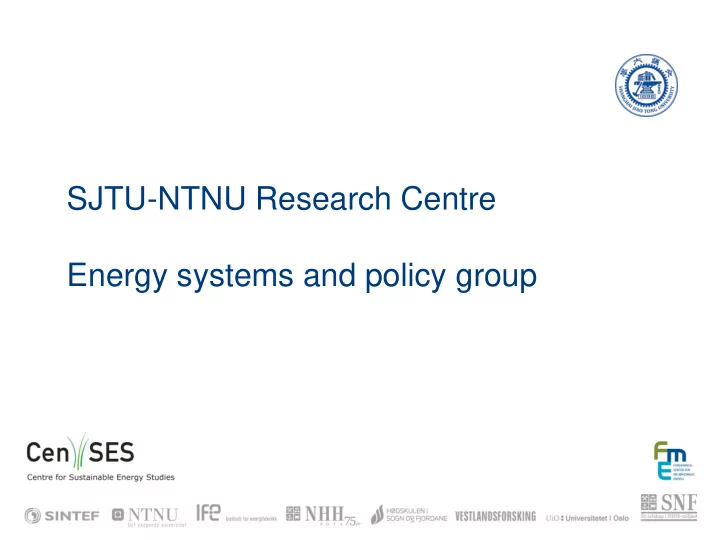

SJTU-NTNU Research Centre Energy systems and policy group
Energy systems and policy group –Sep2011 output Output: 10 articles 1.Development in international of offshore wind journals (two joint), Twin PhD project policy advice & industry tools 2. Energy Output: 2 peer Comparative data reviewed articles in consumption analysis: international and behavioural households journals, policy aspects advice & tools Output: a techno- 3. Energy economic-social Integrate system model energy system findings from 2. model
Status today: Offshore wind strategies and industry development in Norway and China •PhD student, Marius Korsnes, employed from May 2012 • Technological development is a product of interaction and dynamics between a heterogeneous set of actors, technologies and objects •Studying innovation and commercialization processes in the offshore wind industry in China and Norway • Addressing creation of knowledge, and (lack of) integration between research driven and experience driven modes of learning • Qualitative and quantitative methods •Mapping stakeholders, incentives, barriers
Same sea, different ponds: the development of offshore wind technology and industry in Norway and China • Systemic perspective on technological learning and innovation in and between China and Norway • Which actors are involved? National drivers? Particular challenges? The role and presence of MNCs, domestic entrepreneurs and investors? • How and where is knowledge sourced, produced, assimilated and transferred? The integration between research driven and experience driven modes of learning? • Where is the power - the role of economist, engineers and other actors in decision making processes regarding energy systems and technological learning? • Case study: Norwegian OW activity in China • Drivers and barriers on both sides • Insider outsider interaction, dual learning process • Identify opportunities for mutually beneficial industrial cooperation, means of facilitating
Plans for carrying out the project 1-6 months • Write up a concrete research proposal, courses • State of the art paper • Plan collection of data • Finalize paper comparing Chinese and Norwegian technology strategies in offshore wind 7-14: data collection and cooperation in China 15-20: Writing up papers 21- 27:Data collection , 2nd period 27-36 Write up thesis, general dissemination
Plans for involving industrial partners • Map out relevant industries • Contact (Shanghai Electric, Statoil, CNOOC, Sway etc) • Recruitment of Master and PhDstudent who have been involved in these relevant to the company
Household Energy Behavior How to guide a low-carbon, low energy consumption living behavior? Combine data from China and Norway Use the benefit of the strong energy model
Plans for development of larger cooperation project on agent based energy policy model Develop agent based model with input from new data: company behaviour, how they react with market and policies Company, suppliers behaviour in the wind industry , governments behaviour/interest and what will happen, how will they react given prices and policies • how they react with the market (price) • Used for evaluating policies • What is the effect after 5-10 years
Further plan How to use the model for: • Develop policy for offshore wind • For clean development mechanism etc • Exchange of professors both ways • Possible sources for further funding and cooperation: • International Energy research Centre • MOST (Ministry of Science and technology) • Chinese Social and Natural Science foundation • Norwegian Research Council
Energy and society course • Successfull course at NTNU for engineering students • Energy policy and framework conditions, Innovation and public engagement • Develop similar course at Jiaotong • Strengthen NTNU course with lectures from Jiaotong professors (international cases)
Recommend
More recommend